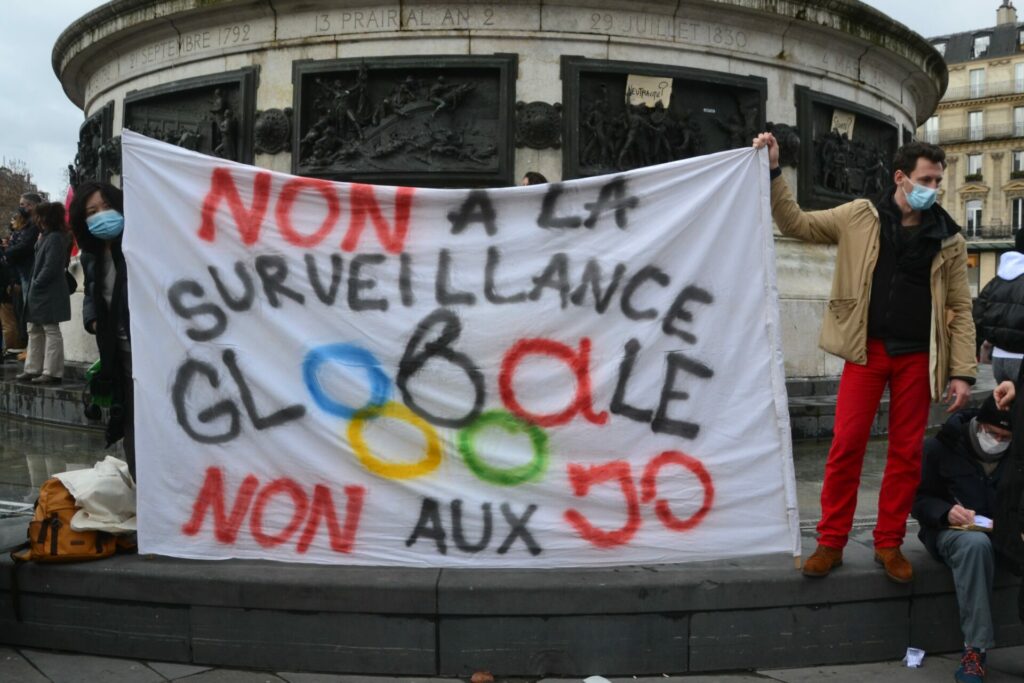On Tuesday, the French Parliament adopted the large-scale use of real-time video surveillance, powered by artificial intelligence, as part of security law for the 2024 Olympic Games.
As France is embroiled in mass social unrest in face of the retirement reform forcefully passed by the government, the Parliament passed an unprecedented expansion of the public surveillance system.
This is the first time algorithmic mass surveillance is authorised in Europe, with experts arguing it may undermine the EU’s efforts to regulate artificial intelligence, France24 reports.
"This decision, which legalises the use of AI-powered surveillance for the first time in France and the EU, risks permanently transforming France into a dystopian surveillance state, and allowing large-scale violations of human rights elsewhere in the bloc," said Amnesty International’s Advocacy Advisor on AI Regulation, Mher Hakobyan, in an earlier statement. He added that the law amounts to "an all-out assault on the rights to privacy, protest, and freedom of assembly and expression".
France intends to experiment with the “algorithmic processing” of video surveillance, arguing it would “ensure the safety of sportive, recreative, and cultural events”, while EU lawmakers and activists warn that it would violate the right to privacy and undermine fundamental civil rights.
France must stop plans of biometric mass surveillance of citizens during Olympic games!
This would be a massive assault on the rights of privacy, data protection & freedom of expression. Read the letter of 41 MEPs across parties to the French Parliament: https://t.co/6ehiJU2hxl pic.twitter.com/G2X5Z5egqC — Greens/EFA in the EU Parliament 🌍 (@GreensEFA) March 20, 2023
Although the text of the law is targeted towards the organisation of the Olympic and Paralympic Games, the use of AI mass surveillance can start as soon as the law is implemented (including the 2023 World Rugby Cup), and it is set to end on December 31st, 2024 – four months after the end of the games.
New era for mass surveillance
Even if technically temporary, human rights advocates argue that this “experimentation” would open the gates to AI-powered mass surveillance, as police powers and the state's arsenal of surveillance equipment will be reinforced and increased.
AI-driven surveillance analyses footage in real-time, scans and captures data from all people within its radius, and makes predictions and determinations about them. Proponents argue that the software will anticipate crowd movements, notice abandoned luggage, and could therefore prevent terror attacks or fatal crowd crushes.
"It's classic for the Olympic Games to be used to pass things that wouldn't pass in normal times," digital rights activist Naomi Levain from La Quadrature du Net told AFP. The 2012 London Olympics saw the beginning of widespread video surveillance in the city and the 2018 World Cup in Russia introduced voice recognition technology that was then used for repression, France24 reports.
With AI technology, French officials and law enforcement are looking to detect “suspicious” activity in crowds, on public transport, in stadiums, in queues for events, and so on.
"These overly broad definitions set by officials to categorise ‘suspicious’ and ‘abnormal’ activities in crowds are highly concerning," said Amnesty International's Secretary-General, Agnes Callamard, in regard to the new French law. "These technologies amplify racist policing and threaten the right to protest. Ethnic minorities — including migrants, and Black and Brown people — are most at risk of being targeted by certain surveillance tools, especially facial recognition systems,”
France is planning to use AI video surveillance at the 2024 Paris Olympics 🔭
Should mass surveillance be legalised by France, one of the biggest sporting events on Earth risks becoming one of the greatest-ever violations of the right to privacy. pic.twitter.com/6ljqenlYhw — Amnesty International (@amnesty) March 21, 2023
40 European lawmakers addressed a letter to the French deputies, in anticipation of the parliamentary discussion of the surveillance provision from two weeks ago. They warned the deputies that the passing of this law establishes a dangerous precedent in all of Europe and that the technology has been proven to not be effective in violence prevention.
The French AI surveillance “experiment” may contradict upcoming EU regulation on artificial intelligence: the European AI act has been in the works for two years, and its original draft included a ban on the use of real-time remote biometric identification systems.
The new French law talks primarily of algorithmic surveillance, and it specifies that it shall not be used for biometric surveillance, however, French digital rights activists from La Quadrature du Net insist that the technology “permanently identifies, analyses and classifies bodies, physical attributes, gestures, silhouettes, movements, which are unquestionably biometric data.”
Since 2014, the EU Court of Justice has banned surveillance practices in numerous decisions, especially around data retention, but Member States continue to find loopholes and undermine their citizens’ right to privacy.
Just last year Belgium passed such a law on data surveillance, allowing the country to keep data on people, such as location and traffic, to aid law enforcement for security purposes.

